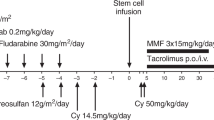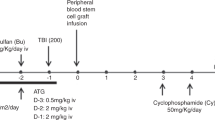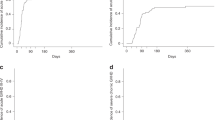Abstract
Allo-SCT is regularly performed in advanced lymphoma. Haploidentical family donors are a valuable source of hematopoietic stem cells and transplants from these donors, using T-repleted grafts, has recently been successfully reported. We report on 49 patients with refractory lymphoma who received T-repleted haploidentical SCT with a non-myeloablative regimen and post-transplant CY. The median time to recover ANC >0.5 × 10e9/L and transfusion independent plt count >20 × 10e9/L was 20 days (range 14–38) and 26 days (range 14–395). The probability to reach ANC >0.5 × 10e9/L at 30 days was 87% and transfusion independent plt count >20 × 10e9/L at 100 days was 87%. The cumulative incidence of grade 2–4 acute GVHD (aGVHD) was 25.6% (95% confidence interval (CI): 12.9–38.3%) and the cumulative incidence of chronic GVHD (cGVHD) was 5.2% (95% CI: 0–12.4%). The median follow-up is 20.6 months (range 12–54), and the projected 2-year OS and PFS were 71 and 63%. The relapse rate was 18.7% (95% CI: 7.6–29.8%) and the median time to relapse was 4.4 months (range 1.1–8.3). At 2 years, cumulative incidence of NRM was 16.3% (95% CI: 5.9–26.8%). T-repleted Haploidentical transplantation with post-infusion CY is a feasible and effective therapy in the poor prognosis of advanced lymphoma patients.
This is a preview of subscription content, access via your institution
Access options
Subscribe to this journal
Receive 12 print issues and online access
$259.00 per year
only $21.58 per issue
Buy this article
- Purchase on Springer Link
- Instant access to full article PDF
Prices may be subject to local taxes which are calculated during checkout



Similar content being viewed by others
Change history
03 December 2014
This article has been corrected since Advance Online Publication and a corrigendum is also printed in this issue.
References
Linch DC, Winfield D, Goldstone AH, Moir D, Hancock B, McMillan A et al. Dose intensification with autologus bone marrow transplantation in relapsed and resistant Hodgkin’s disease: results of a BNLI randomized trial. Lancet 1993; 341: 1051–1054.
Schmitz N, Pfistner B, Sextro M, Sieber M, Carella AM, Haenel M et al. Aggressive conventional chemotherapy compared with high-dose chemotherapy with autologous haemopoietic SCT for relapsed chemosensitive Hodgkin’s disease: a randomized trial. Lancet 2002; 359: 2065–2071.
Philip T, Guglielmi C, Hagenbeek A, Somers R, Van der Lelie H, Bron D et al. Autologous bone marrow transplantation as compared with salvage chemotherapy in relapses of chemotherapy-sensitive non-Hodgkin's lymphoma. N Engl J Med 1995; 333: 1540–1548.
Gisselbrecht C, Schmitz N, Mounier N, Singh Gill D, Linch DC, Trneny M et al. Rituximab maintenance therapy after autologous stem-cell transplantation in patients with relapsed CD20(+) diffuse large B-cell lymphoma: final analysis of the collaborative trial in relapsed aggressive lymphoma. J Clin Oncol 2012; 30: 4462–4469.
Reimer P, Rüdiger T, Geissinger E, Weissinger F, Nerl C, Schmitz N et al. Autologous stem-cell transplantation as first-line therapy in peripheral T-cell lymphomas: results of a prospective multicenter study. J Clin Oncol 2009; 27: 106–113.
Schouten HC, Qian W, Kvaloy S, Porcellini A, Hagberg H, Johnsen HE et al. High-dose therapy improves progression-free survival and survival in relapsed follicular non-Hodgkin's lymphoma: results from the randomized European CUP trial. J Clin Oncol 2003; 21: 3918–3927.
Robinson SP., Goldstone AH, Mackinnon S, Carella A, Russell N, Ruiz de Elvira C et al. Chemoresistant or aggressive lymphoma predicts for a poor outcome following reduced-intensity allogeneic progenitor cell transplantation: an analysis from the lymphoma working party of the european group for blood and bone marrow transplantation. Blood 2002; 100: 4310–4316.
Peggs KS, Hunter A, Chopra R, Parker A, Mahendra P, Milligan D et al. Clinical evidence of a graft-versus-Hodgkin's-lymphoma effect after reduced-intensity allogeneic transplantation. Lancet 2005; 365: 1934–1941.
Peggs KS, Kayani I, Edwards N, Kottaridis P, Goldstone AH, Linch DC et al. Donor lymphocyte infusions modulate relapse risk in mixed chimeras and induce durable salvage in relapsed patients after T-cell-depleted allogeneic transplantation for Hodgkin's lymphoma. J Clin Oncol 2011; 29: 971–978.
Anderlini P, Saliba R, Acholonu S, Giralt SA, Andersson B, Ueno NT et al. Fludarabine-melphalan as a preparative regimen for reduced-intensity conditioning allogeneic SCT in relapsed and refractory Hodgkin's lymphoma: the updated M.D. Anderson Cancer Center experience. Haematologica 2008; 93: 257–264.
Alvarez I, Sureda A, Caballero MD, Urbano-Ispizua A, Ribera JM, Canales M et al. Nonmyeloablative SCT is an effective therapy for refractory or relapsed hodgkin lymphoma: results of a spanish prospective cooperative protocol. Biol Blood Marrow Transplant 2006; 12: 172–183.
Robinson SP, Sureda A, Canals C, Russell N, Caballero D, Bacigalupo A et al. Reduced intensity conditioning allogeneic SCT for Hodgkin's lymphoma: identification of prognostic factors predicting outcome. Haematologica 2009; 94: 230–238.
Corradini P, Dodero A, Farina L, Fanin R, Patriarca F, Miceli R et al. Allogeneic SCT following reduced-intensity conditioning can induce durable clinical and molecular remissions in relapsed lymphomas: pre-transplant disease status and histotype heavily influence outcome. Leukemia 2007; 21: 2316–2323.
Todisco E, Castagna L, Sarina B, Mazza R, Anastasia A, Balzarotti M et al. Reduced-intensity allogeneic transplantation in patients with refractory or progressive Hodgkin's disease after high-dose chemotherapy and autologous stem cell infusion. Eur J Haematol 2007; 78: 322–329.
Sureda A, Canals C, Arranz R, Caballero D, Ribera JM, Brune M et al. Allogeneic SCT after reduced intensity conditioning in patients with relapsed or refractory Hodgkin's lymphoma Results of the HDR-ALLO study- a prospective clinical trial by the Grupo Español de Linfomas/Trasplante de Médula Osea (GEL/TAMO) and the Lymphoma Working Party of the European Group for Blood and Marrow Transplantation. Haematologica 2012; 97: 310–317.
Luznik L, O'Donnell PV, Symons HJ, Chen AR, Leffell MS, Zahurak M et al. HLA-haploidentical bone marrow transplantation for hematologic malignancies using nonmyeloablative conditioning and high-dose, posttransplantation CY. Biol Blood Marrow Transplant 2008; 14: 641–650.
Luznik L, Engstrom LW, Iannone R, Fuchs EJ . Posttransplantation CY facilitates engraftment of major histocompatibility complex-identical allogeneic marrow in mice conditioned with low-dose total body irradiation. Biol Blood Marrow Transplant 2002; 8: 131–138.
Gordon M Y, Goldman JM, Gordon-Smith EC . 4-HydroperoxyCY inhibits proliferation by human granulocytemacrophage colony-forming cells (GM-CFC) but spares more primitive progenitor cells. Leuk Res 1985; 9: 1017–1021.
Sorror ML, Maris MB, Storb R, Baron F, Sandmaier BM, Maloney DG et al. Hematopoietic cell transplantation (HCT)-specific comorbidity index: a new tool for risk assessment before allogeneic HCT. Blood 2005; 106: 2912–2919.
Przepiorka D, Weisdorf D, Martin P, Klingemann HG, Beatty P, Hows J et al 1994 Consensus conference on acute GVHD grading. Bone Marrow Transplant 1995; 15: 825–828.
Filipovich AH, Weisdorf D, Pavletic S, Socie G, Wingard JR, Lee SJ et al. National Institutes of Health consensus development project on criteria for clinical trials in chronic graft-versus-host disease: I. Diagnosis and staging working group report. Biol Blood Marrow Transplant 2005; 11: 945–956.
Chakraverty R, Mackinnon S . Allogeneic transplantation for lymphoma. J Clin Oncol 2011; 29: 1855–1863.
Anasetti C, Amos D, Beatty PG, Appelbaum FR, Bensinger W, Buckner CD et al. Effect of HLA compatibility on engraftment of bone marrow transplants in patients with leukemia or lymphoma. N Engl J Med 1989; 320: 197–204.
Aversa F, Terenzi A, Tabilio A, Falzetti F, Carotti A, Ballanti S et al. Full haplotype-mismatched hematopoietic stem-cell transplantation: a phase II study in patients with acute leukemia at high risk of relapse. J Clin Oncol 2005; 23: 3447–3454.
Ciceri F, Bonini C, Stanghellini MT, Bondanza A, Traversari C, Salomoni M et al. Infusion of suicide-gene-engineered donor lymphocytes after family haploidentical haemopoietic stem-cell transplantation for leukaemia (the TK007 trial): a non-randomised phase I-II study. Lancet Oncol 2009; 10: 489–500.
Tiberghien P, Ferrand C, Lioure B, Milpied N, Angonin R, Deconinck E et al. Administration of herpes simplex-thymidine kinase-expressing donor T cells with a T-cell-depleted allogeneic marrow graft. Blood 2001; 97: 63–72.
Federmann B, Bornhauser M, Meisner C, Kordelas L, Beelen DW, Stuhler G et al. Haploidentical allogeneic hematopoietic cell transplantation in adults using CD3/CD19 depletion and reduced intensity conditioning: a phase II study. Haematologica 2012; 97: 1523–1531.
Ciurea SO, de Lima M, Cano P, Korbling M, Giralt S, Shpall EJ et al. High risk of graft failure in patients with anti-hla antibodies undergoing haploidentical stem-cell transplantation. Transplantation 2009; 88: 1019–1024.
Luznik L, Jones RJ, Fuchs EJ . High-dose CY for graft-versus-host disease prevention. Curr Opin Hematol 2010; 17: 493–499.
Burroughs LM, O'Donnell PV, Sandmaier BM, Storer BE, Luznik L, Symons HJ et al. Comparison of outcomes of HLA-matched related, unrelated, or HLA-haploidentical related hematopoietic cell transplantation following nonmyeloablative conditioning for relapsed or refractory Hodgkin lymphoma. Biol Blood Marrow Transplant 2008; 14: 1279–1287.
Tuve S, Gayoso J, Scheid C, Radke J, Kiani A, Serrano D et al. Haploidentical bone marrow transplantation with post-grafting CY: multicenter experience with an alternative salvage strategy. Leukemia 2011; 25: 880–883.
Rodrigues CA, Sanz G, Brunstein CG, Sanz J, Wagner JE, Renaud M et al. Analysis of risk factors for outcomes after unrelated cord blood transplantation in adults with lymphoid malignancies: a study by the Eurocord-Netcord and lymphoma working party of the European group for blood and marrow transplantation. J Clin Oncol 2009; 27: 256–263.
van Besien K, Carreras J, Bierman PJ, Logan BR, Molina A, King R et al. Unrelated donor hematopoietic cell transplantation for non-Hodgkin lymphoma: long-term outcomes. Biol Blood Marrow Transplant 2009; 15: 554–563.
Devetten MP, Hari PN, Carreras J, Logan BR, van Besien K, Bredeson CN et al. Unrelated donor reduced-intensity allogeneic hematopoietic SCT for relapsed and refractory Hodgkin lymphoma. Biol Blood Marrow Transplant 2009; 15: 109–117.
Kusumi E, Kami M, Kanda Y, Murashige N, Kishi Y, Suzuki R et al. Reduced-intensity hematopoietic stem-cell transplantation for malignant lymphoma: a retrospective survey of 112 adult patients in Japan. Bone Marrow Transplant 2005; 36: 205–213.
Armand P, Kim HT, Ho VT, Cutler CS, Koreth J, Antin JH et al. Allogeneic transplantation with reduced-intensity conditioning for Hodgkin and non-Hodgkin lymphoma: importance of histology for outcome. Biol Blood Marrow Transplant 2008; 14: 418–425.
Acknowledgements
We thank Dr FB Petersen, SLC, Utah, USA for critical lecture and suggestions.
Author information
Authors and Affiliations
Corresponding author
Ethics declarations
Competing interests
The authors declare no conflict of interest.
Rights and permissions
About this article
Cite this article
Castagna, L., Bramanti, S., Furst, S. et al. Nonmyeloablative conditioning, unmanipulated haploidentical SCT and post-infusion CY for advanced lymphomas. Bone Marrow Transplant 49, 1475–1480 (2014). https://doi.org/10.1038/bmt.2014.197
Received:
Revised:
Accepted:
Published:
Issue Date:
DOI: https://doi.org/10.1038/bmt.2014.197
This article is cited by
-
Bone marrow graft versus peripheral blood graft in haploidentical hematopoietic stem cells transplantation: a retrospective analysis in1344 patients of SFGM-TC registry
Journal of Hematology & Oncology (2024)
-
Thiotepa and antithymocyte globulin-based conditioning prior to haploidentical transplantation with posttransplant cyclophosphamide in high-risk hematological malignancies
Bone Marrow Transplantation (2020)
-
The new refined minnesota risk score for acute graft-versus-host disease predicts overall survival and non-relapse mortality after T cell-replete haploidentical stem cell transplant with post-transplant cyclophosphamide
Bone Marrow Transplantation (2019)
-
Treatment of classical Hodgkin lymphoma in the era of brentuximab vedotin and immune checkpoint inhibitors
Annals of Hematology (2018)
-
Prior history of HLA-mismatched stem cell transplantation is a risk factor for graft failure in HLA-haploidentical transplantation
Bone Marrow Transplantation (2017)



